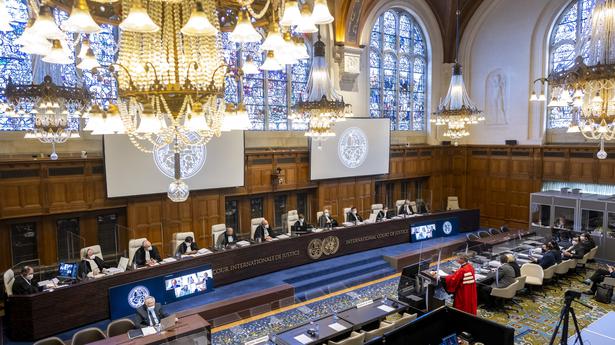
Russia-Ukraine conflict: ICJ’s provisional measures on military operations
The Hindu
Can the International Court of Justice mandate a ruling in the current crisis happening in Eastern Europe?
The story so far: The ongoing conflict between Ukraine and Russia has entered its fourth week. It has led to one of the most severe humanitarian crises in Europe since World War II. Russia has sought to justify its “special military operation” as a response to the alleged act of genocide of the Russian speaking people in the territories of Donetsk and Luhansk. Ukraine on February 26 approached the International Court of Justice (ICJ), the principal judicial organ of the United Nations (UN), requesting the ICJ among other things, to hold that no acts of genocide defined under the Genocide Convention 1948 and as claimed by Russia have been committed by Ukraine in Donetsk and Luhansk. Additionally, Ukraine also requested the court to indicate certain provisional measures, such as directing the Russian Federation to “immediately suspend military operations” in Ukraine, and to ensure that Russia will not aggravate or extend the dispute. The ICJ on March 16, rendered its order directing the Russian federation inter alia to immediately suspend all military operations in Ukraine.
Article 36(1) of the Statute of the ICJ provides that the ICJ shall have jurisdiction in all matters relating to the UN Charter, or other treaties or conventions in force. The Genocide Convention 1948 under Article IX provides that disputes between states relating to the interpretation, application or fulfilment of the Genocide Convention, as well as those relating to the responsibility of a state for genocide shall be submitted to the ICJ at the request of any of the parties to the dispute. Russia and Ukraine are both parties to the Genocide Convention. The ICJ held that there exists a prima facie dispute between Ukraine and Russia over the question of whether the acts of genocide have been committed in Ukraine, and accordingly it has the jurisdiction.
The Statute of the International Court of Justice, under Article 41 empowers the ICJ to indicate provisional measures in any case before it in order to preserve the rights of the parties involved. When the ICJ indicates such provisional measures, the parties to the dispute and the UN Security Council have to be notified. Until 2001, there was uncertainty as to whether the provisional measures indicated by the ICJ were binding. However, in the LaGrand (2001) case between Germany and the U.S. relating to the denial of consular access to a German national in the U.S., the ICJ made it clear that provisional measures are binding in character and create international legal obligations. Further, provisional measures may be indicated by the ICJ either on the request of a state party or proprio motu i.e., on its own motion. The ICJ has also held in the Tehran Hostages Case (1980) that the non-appearance of one of the parties concerned cannot itself be an obstacle to indication of provisional measures. In the present case, the Russian Federation chose not appear in the oral proceedings before the court. Notwithstanding, the ICJ proceeded to decide the case.
The power to indicate provisional measures is subject to certain conditions.
In the Gambia v. Myanmar (2020) case dealing with genocide of Rohingyas in Myanmar, the ICJ held that it may exercise the power to indicate provisional measures only if it is satisfied that rights which are being asserted by the party which is requesting provisional measures is “at least plausible”. The ICJ in the present case held that Ukraine indeed has a plausible “right of not being subjected to military operations by the Russian Federation for the purpose of punishing and preventing alleged acts of genocide.” The ICJ expressed doubt regarding the use of unilateral military force against another state for preventing and punishing genocide, as a means under the Genocide Convention 1948. It highlighted that the Genocide Convention provides for other means such as resort to other UN organs under Article VIII, and for peaceful dispute settlement by ICJ under Article IX. It is important to note here that the ICJ at the stage of provisional measures does not engage in a definitive analysis of whether rights which are claimed by the applicant actually exist. That analysis is for the merits phase.
Second, there must exist a link between the provisional measure which has been requested and the plausible right that is to be preserved by such measure.
Third, there must be “real and imminent risk” of “irreparable prejudice” to the rights claimed before the ICJ. The court observed that the mounting loss of human lives, harm to environment, and the refugee crisis are all instances of irreparable harm and prejudice justifying the indication of provisional measures.













